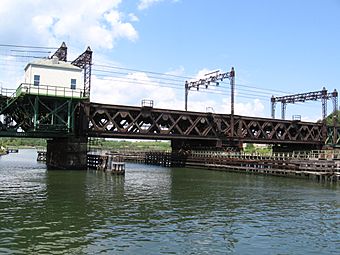Norwalk River Railroad Bridge facts for kids
Quick facts for kids |
|
|
Norwalk River Railroad Bridge
|
|

Close up of bridge, in 2007
|
|
| Location | Norwalk, Connecticut |
|---|---|
| Area | 1 acre (0.40 ha) |
| Built | 1896 |
| Architectural style | Rim Bearing, Swing |
| MPS | Movable Railroad Bridges on the NE Corridor in Connecticut TR |
| NRHP reference No. | 87000844 |
| Added to NRHP | June 12, 1987 |
The Norwalk River Railroad Bridge, also known as the Walk Bridge, is a special kind of bridge built way back in 1896. It helps trains like Amtrak and Metro-North Railroad cross over the Norwalk River in Norwalk, Connecticut. This bridge is a "swing bridge," which means a part of it can turn to let boats pass by!
Contents
Building the Walk Bridge
The Walk Bridge was built in 1896 by the New York, New Haven and Hartford Railroad. At the same time, they also made their train route wider to have four tracks. The bridge is about 562 feet (171 meters) long.
How the Swing Bridge Works
A big part of the bridge, about 202 feet (62 meters) long, can actually rotate. This allows tall boats and ships to pass through the river. It works using a special "rim-bearing system" with 96 rollers. Imagine a giant lazy Susan that the bridge spins on!
The company that built this part was called the Berlin Iron Bridge Co.. This type of swing bridge is quite rare today. Only 13 bridges from this company still exist in Connecticut, and only two of them are railroad bridges like this one.
Electrifying the Tracks
In 1907, the train tracks over the bridge were updated. They added overhead wires called "catenary wires" to power the trains with electricity. You can still see these wires on the bridge today.
A Historic Landmark
The Norwalk River Railroad Bridge is an important part of history. It was added to the National Register of Historic Places in 1987. This means it's recognized as a significant historical structure.
Other Movable Bridges in Connecticut
The Walk Bridge is one of eight movable bridges on the Amtrak train route through Connecticut. These bridges are all designed to let boats pass. Here are some of the others, from west to east:
- Mianus River Railroad Bridge at Cos Cob (built 1904)
- Saugatuck River Railroad Bridge at Westport (built 1905)
- Pequonnock River Railroad Bridge at Bridgeport (built 1902)
- Housatonic River Railroad Bridge at Devon (built 1905)
- Connecticut River Railroad Bridge between Old Saybrook and Old Lyme (built 1907)
- Niantic River Bridge between East Lyme and Waterford (built 1907)
- Thames River Bridge (Amtrak) at Groton (built 1919)
The Future of the Walk Bridge
Because the Walk Bridge is very old and its moving parts are getting worn out, it sometimes causes delays for trains. It's a single moving section, and older machines can break down.
To make train travel smoother and more reliable, there are plans to replace the Walk Bridge. The new design will be a "vertical-lift bridge." This means a section of the bridge will lift straight up, instead of swinging, to let boats pass. This new bridge will have two separate sections that can lift, making it even more reliable.
 | DeHart Hubbard |
 | Wilma Rudolph |
 | Jesse Owens |
 | Jackie Joyner-Kersee |
 | Major Taylor |



